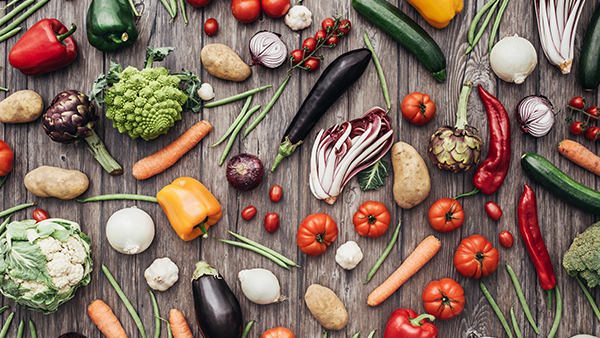Diet and fertility can go hand in hand
If you're trying to have a baby give nature a helping hand and adjust your eating habits. There's no magic diet to guarantee you'll get pregnant but certain foods can have a positive effect on your fertility. Here are some tips!
Read time: 4 m
Verified by Jenny Jansson
Certified midwife
Your diet affects your blood, your cells, and your hormones. A balanced diet with vitamins, minerals, and iron from fruit and vegetables can increase the chances of getting pregnant. Make sure you eat enough of the right protein, fat, and carbohydrate to give yourself the best chance of conception.
Beneficial fats
Fat from vegetable oil, nuts, seeds, avocado, olives, and oily fish are good fats to eat if you want to get pregnant. Fat makes it easy for your body to absorb vitamins like vitamins A, D, E, and K. Choose full-fat dairy products as low-fat dairy products can negatively affect ovulation. Try to avoid trans-fats as just small amounts can also negatively affect ovulation.
Important vitamins
Vitamin B, C, and D are important ingredients for fertility. There are high quantities of vitamin B and folic acid in green vegetables such as broccoli, spinach, and asparagus that are important for the fetal central nervous system. Take 400 micrograms of folic acid per day when you are trying to conceive, until week 12 of the pregnancy. This is medical advice for women who are trying to have a baby.
Vitamin C helps your body absorb iron and is found in a range of fruit and vegetables. Eat a range of colors and types and you'll get the right amount of vitamin C the natural way.
Vitamin D is important for effective ovulation, so get at least one hour of daylight every day and take supplements in the winter.
Vitamin E can also positively affect your fertility. Vitamin E is found in cold-pressed vegetable oil, nuts, egg, avocado, and liver.
Good fish
Fish contains lots of key nutrients such as iodine, selenium, and vitamin D so it's an excellent choice when you're trying to have a baby. Salmon, mackerel, and other oily fish are full of omega 3 which is great for fertility as well as fetal brain and eye development. Omega 3 fats contribute to a regular menstrual cycle and can even improve egg quality. Check which fish are good for you as some contain high levels of mercury.
Good protein
Protein is an important part of a balanced and varied diet. Research has shown that it's important to limit your intake of animal protein when you're trying to have a baby. Choose plant proteins such as beans, pulses, nuts, soya, tofu, and avocado as an alternative to red meat, pork, and chicken.
Carbohydrates and fiber
Avoid simple carbohydrates like white flour and sugar as they raise your insulin levels. This can negatively affect the function of the ovaries and even cause infertility. Choose wholegrain products that contain higher levels of fiber, iron, and vitamin B and combine with carbohydrates from vegetables, root vegetables, pulses, fruits, and berries, which also contain fiber, vitamins, and minerals
Fiber can regulate estrogen levels and is found in a range of fruit and vegetables and wholegrain products. Be aware that the nutrient content in fruit and vegetables can vary quite a lot so it's best to eat vegetables that have ripened naturally in the spring and summer sun. The recommendation is 25 - 35 grams of fiber per day. Choose seasonal produce.
Avoid the fast calories in sweets, chocolate, and fizzy drinks.
Drink water
Water is the best drink if you're trying to have a baby. Try to drink between one and a half and two liters of water a day. Water contains lots of key minerals, for example, calcium, iodine, and magnesium.
Choose organic
Organic products contain lower levels of nitrates and toxins and contain vitamins and minerals that can increase your fertility.
Watch your coffee intake
Don't drink more than two or three cups of tea or coffee per day when you're trying to have a baby. More than 500 mg of caffeine per day could affect your fertility, although there haven't been any definitive studies.
Don't drink alcohol
Alcohol can negatively affect ovulation and is a risk factor for infertility. Don't drink alcohol for maximum fertility.
Verified by Jenny Jansson
Certified midwife
More from Preggers
Hundreds of related articles, podcasts & more waiting for you in the Preggers app.
Download Preggers today.

